An Introduction by Kamala Das - Sandal S Anshu
Kamala Das is a prominent Indian poet who is now no more in this world. She is primarily a confessional poet. Her poems are feminine in theme and feminine in tone. In this context she can be compared with Anne Sexton and Sylvia Plath. Kamala's best known work is My Story. It is an autobiography of Kamala Das. It is regarded as a classic.
Kamala Das's popular collections of poetry are Summer in Calcutta (1965), The Descendants (1967) and The Old Playhouse and Other Poems (1973).
Kamala's An Introduction is a very popular poem. It is taken from her first collection of poems named Summer in Calcutta. It has been written in a confessional tone. The life of the poet finds beautiful expression in this poem. The following is the text of that poem:
An Introduction: Kamala Das
I don't know politics but I know the names
Of those in power, and can repeat them like
Days of week, or names of months, beginning with Nehru.
I am Indian, very brown, born in Malabar,
I speak three languages, write in
Two, dream in one.
Don't write in English, they said, English is
Not your mother-tongue. Why not leave
Me alone, critics, friends, visiting cousins,
Every one of you? Why not let me speak in
Any language I like? The language I speak,
Becomes mine, its distortions, its queernesses
All mine, mine alone.
It is half English, half Indian, funny perhaps, but it is honest,
It is as human as I am human, don't
You see? It voices my joys, my longings, my
Hopes, and it is useful to me as cawing
Is to crows or roaring to the lions, it
Is human speech, the speech of the mind that is
Here and not there, a mind that sees and hears and
Is aware. Not the deaf, blind speech
Of trees in storm or of monsoon clouds or of rain or the
Incoherent mutterings of the blazing
Funeral pyre. I was child, and later they
Told me I grew, for I became tall, my limbs
Swelled and one or two places sprouted hair.
When I asked for love, not knowing what else to ask
For, he drew a youth of sixteen into the
Bedroom and closed the door, He did not beat me
But my sad woman-body felt so beaten.
The weight of my breasts and womb crushed me.
I shrank Pitifully.
Then … I wore a shirt and my
Brother's trousers, cut my hair short and ignored
My womanliness. Dress in sarees, be girl
Be wife, they said. Be embroiderer, be cook,
Be a quarreller with servants. Fit in. Oh,
Belong, cried the categorizers. Don't sit
On walls or peep in through our lace-draped windows.
Be Amy, or be Kamala. Or, better
Still, be Madhavikutty. It is time to
Choose a name, a role. Don't play pretending games.
Don't play at schizophrenia or be a
Nympho. Don't cry embarrassingly loud when
Jilted in love … I met a man, loved him. Call
Him not by any name, he is every man
Who wants. a woman, just as I am every
Woman who seeks love. In him . . . the hungry haste
Of rivers, in me . . . the oceans' tireless
Waiting. Who are you, I ask each and everyone,
The answer is, it is I. Anywhere and,
Everywhere, I see the one who calls himself I
In this world, he is tightly packed like the
Sword in its sheath. It is I who drink lonely
Drinks at twelve, midnight, in hotels of strange towns,
It is I who laugh, it is I who make love
And then, feel shame, it is I who lie dying
With a rattle in my throat. I am sinner,
I am saint. I am the beloved and the
Betrayed. I have no joys that are not yours, no
Aches which are not yours. I too call myself I.

Comments
Post a Comment